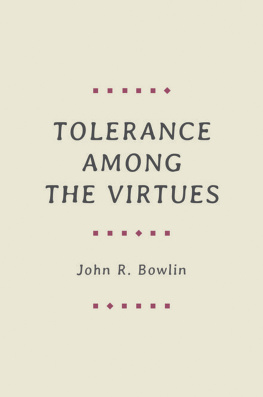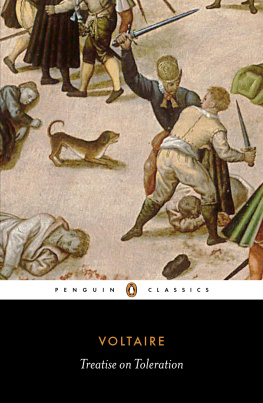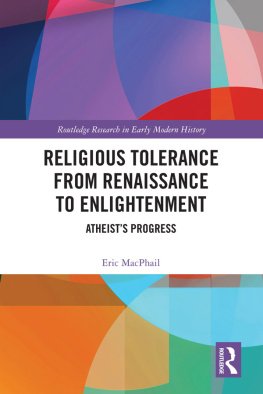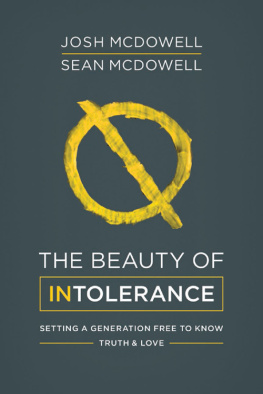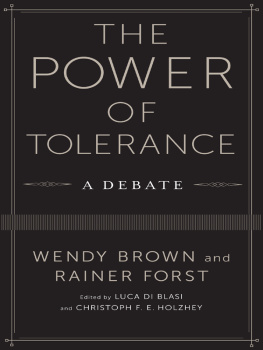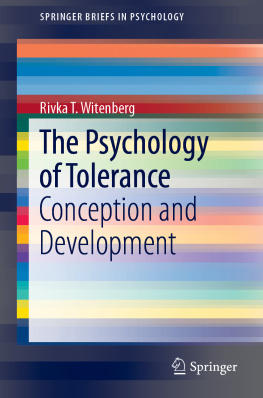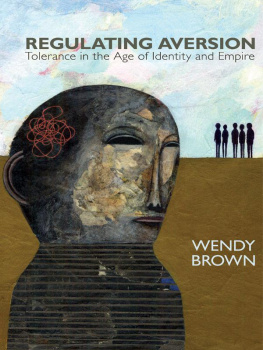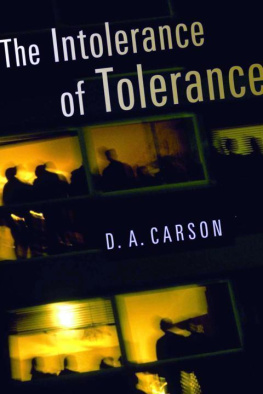
TOLERANCE AMONG THE VIRTUES
TOLERANCE AMONG THE VIRTUES
John R. Bowlin
PRINCETON UNIVERSITY PRESS
Princeton and Oxford
Copyright 2016 by Princeton University Press
Published by Princeton University Press,
41 William Street,
Princeton, New Jersey 08540
In the United Kingdom: Princeton University Press,
6 Oxford Street, Woodstock, Oxfordshire OX20 1TR
press.princeton.edu
All Rights Reserved
ISBN 978-0-691-16997-2
Library of Congress Control Number: 2016935713
British Library Cataloging-in-Publication Data is available
This book has been composed in Sabon Next LT Pro
Printed on acid-free paper
Printed in the United States of America
1 3 5 7 9 10 8 6 4 2
For Nicholas and Isaac
CONTENTS
CHAPTER 1
TOLERANCE AND RESENTMENT |
18
|
CHAPTER 2
A NATURAL VIRTUE |
60
|
CHAPTER 3
AMONG THE VIRTUES |
106
|
CHAPTER 4
A VIRTUES VOCABULARY |
160
|
CHAPTER 5
LIBERALISM AND LISTS |
187
|
CHAPTER 6
LOVES ENDURANCE |
206
|
EPILOGUE
NATURE, GRACE, AND COCKFIGHTS |
242
|
TOLERANCE AMONG THE VIRTUES
INTRODUCTION
During the spring of 2000 I attended a cockfight in Collinsville, Oklahoma. I tell the tale of that visit and reflect on its significance in the epilogue, but here the point regards the confusion and puzzlement it precipitated. I went to Collinsville as a citizen seeking information about an activity that many in the state wanted to ban. A referendum was scheduled for later that year, and I had never seen a fight. My hunch was that I would find it objectionable and yet tolerable. I assumed that I would vote against the ban in solidarity with the rural and Native peoples who opposed it. But I was mistaken. In fact, I found the fights horrific in their seductive violence and vile in their visible effects. I left Collinsville thinking that the proponents of the referendum were right. Cockfighting was intolerable; a ban would be best.
This judgment was unexpected and disorienting. It caught me off guard, and after a week I came to doubt it. Or rather, I came to doubt that I understood it well enough to maintain it. Did my conclusion that cockfighting was unbearable bear witness to my own intolerance? Intolerance is a vice. Its act wrongs other another person. It denies them a good they are due. (But what was that good and under what conditions was it due? I didnt know.) Did this mean that my refusal to honor this request for toleration was somehow unjust? More troubling still was another thought: was the solidarity I felt for my fellow citizens who led rural lives and claimed Native identities in fact false? Did my refusal to tolerate this violent and (to my mind) objectionable portion of their local traditions signal my own smooth hypocrisy? Was my claim to solidarity more apparent than real? And then the worst thought of all: was I being played? In the stories of tolerance that we tell, hardscrabble towns in the American Bible Belt are not its natural home, and yet toleration was precisely what the members of cockfight clubs across the state were asking from people like me, urban and suburban inhabitants of Tulsa and Oklahoma City. Was their request as much a semblance as my solidarity? Was it a mask that they would remove once they secured the tolerance they wanted but would never offer in return?
INITIAL DISCOVERIES
The truth is, I didnt know how to tell the tale of that trip to Collinsville, to say what I had seen and give an account of its significance. So I did what I have been trained to do. I read around in the relevant literature, some of it scholarly, some of it not. My reading led to a course, the course to a handful of articles, and the articles to this book. It also led to three initial discoveries. First, I discovered that my discontent was widespread. Whatever I read, wherever I turned, there it was. Journalists, theologians, moral philosophers, hipster youth pastors, political theorists, popes, radical critics, college evangelists, political operatives, and scholars of religionall could be found deploring the resort to toleration in response to the differences that divide us, resenting the praise this act so often receives, and resisting the thought that a virtue might be its cause., criticism of tolerance and its act, whatever its source, typically functions as a medium of discontent with modernity. By these lights, toleration is a distinctively modern response to disagreement and difference, and its ills are variations on modernitys own. When it is endorsed nevertheless, the act must be unmasked as a swindle, as a cover for either domination or moral collapse. It must be replaced with some other response. A just political society will leave it behind. A community of hospitality and welcome will proceed without it.
Instead, most scholars and critics, friends and foes alike, have subjected the act of toleration to scrutiny, the act of patiently enduring a person, action, or attitude that is thought to be objectionable in some way, and this has put the debate on precisely the wrong footing. As we shall see, an act of toleration can be good or bad, right or wrong, depending on the ends and circumstances of the act. Some objectionable differences should be patiently endured; others should not. But this means that those who care deeply about certain resorts to the act, who defend those resorts as right and required, and who, as a result, are inclined to declare the act itself essentially good will be accused of moral blindness by those who concentrate on examples of the act that fall short of the right. So too, those who feel nagged or coerced to endure what they consider intolerable and who, as a result, are inclined to declare the act itself essentially bad, will be counted among the intolerant by those who consider the act essentially just and good. So goes the contemporary debate, or at least a good portion of it: misguided judgments about the moral status of the act in general are used as proxies, as smokescreens, in debates over specific instances of the tolerable and the intolerable, over what should and should not be patiently endured, while the virtue that attends to this distinction is hardly considered.
Given the sources and motivations that have shaped the revival of virtue theory in recent years, this might seem understandable. That revival has, for the most part, looked to premodern accounts for inspiration, to the ancients and medievals. If toleration is, as most assume, a modern response to the moral and political challenges posed by diversity and difference, then we should not expect the revivalists to care about the virtue that causes right resort to this act. They dont find it in the premodern sources they borrow and adapt; they dont even look. And why should they? After all, for many, the point of the revival is to locate alternatives to the moral discourses and practices of modernity, discourses and practices that toleration is thought to exemplify, that elicit our discontent, and that provoke the search for moral resources in a time before tolerance, before the eclipse of virtue.
Not surprisingly, most friends of toleration are willing to accept this story that pits act against virtue across the threshold of the modern. For them, a perfectionist account would only entangle toleration in the metaphysical complications and moral compromises of premodern virtue. Such an account would have to refer to ends given by nature and thus to a myth that naturalizes what is in fact contingent, presumably to the benefit of some and the detriment of others. It would have to speak of communal norms and tradition-bound lives and thus endorse an implicit patriarchy. It would accent the imitation of moral exemplars and thus threaten the individuality and special dignity of persons. And its account of desire, intention, and happiness would betray a disregard for duty and allow self-interest to infect even the most praiseworthy actions. Better then, to theorize the act not the virtue, toleration not tolerance, and thus avoid perfectionisms difficulties, or so these friends of toleration conclude.
Next page
